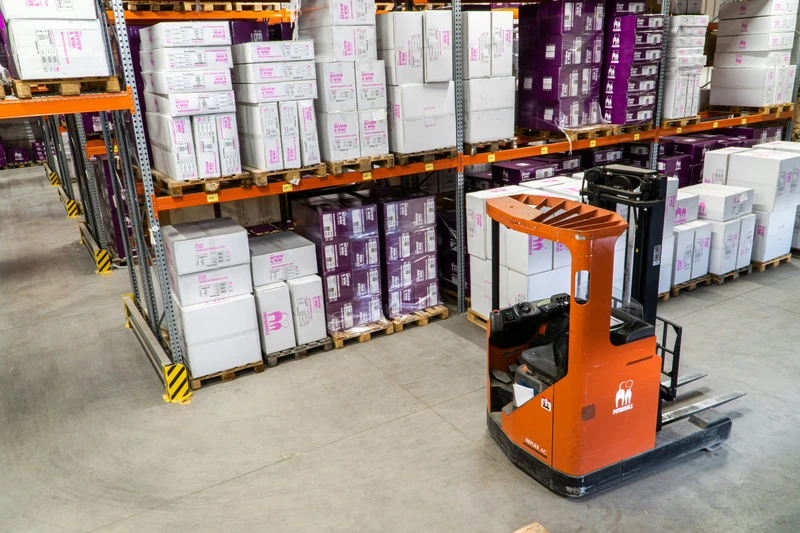
Key Takeaways
- RFID know-how has seen a major rise in reputation on account of its skill to revolutionize stock administration.
- Understanding the fundamentals of RFID tags is essential for companies trying to implement this know-how into their operations.
- RFID know-how enhances stock visibility by offering real-time monitoring and monitoring of things all through the availability chain.
- Implementing RFID know-how can streamline provide chain operations by automating processes and decreasing guide labor.
- RFID know-how improves stock accuracy and effectivity, resulting in lowered stockouts and overstock conditions.
The Rise of RFID Expertise
RFID (Radio Frequency Identification) know-how has been steadily gaining traction in numerous industries, revolutionizing the best way companies method stock administration. This highly effective know-how has advanced considerably over time, providing a compelling various to conventional barcode techniques and driving its elevated adoption throughout numerous sectors.
The evolution of RFID know-how has been marked by important developments in each {hardware} and software program elements. As the price of RFID tags and readers has decreased, and their efficiency has improved, extra organizations have acknowledged the substantial advantages this know-how can carry to their operations. The rising demand for real-time, correct, and complete knowledge on stock ranges and areas has been a major issue behind the rising reputation of RFID.
In comparison with conventional barcode techniques, RFID affords a number of distinct benefits which have contributed to its growing attraction. Barcode scanning requires line-of-sight entry and guide intervention, which could be time-consuming and vulnerable to human error. In distinction, RFID tags could be learn mechanically and wirelessly, even when objects are stacked or hidden from view, offering a extra environment friendly and dependable technique of stock monitoring. Moreover, RFID tags can retailer extra knowledge than barcodes, enabling companies to seize a wealth of details about their merchandise, from expiration dates to temperature histories.
Understanding the Fundamentals of RFID Tags
On the core of RFID know-how are the tags, that are small, wi-fi units that may be hooked up to or embedded inside numerous objects. These tags include a radio frequency (RF) transmitter and receiver, in addition to an built-in circuit for storing and processing knowledge. When an RFID reader, geared up with an antenna, emits a radio frequency sign, the tags reply by transmitting their distinctive identification info again to the reader.
RFID tags are available in three major sorts: passive, lively, and semi-passive. Passive tags should not have an inside energy supply and depend on the vitality generated by the reader’s sign to energy their response. These tags are usually inexpensive and have a shorter learn vary in comparison with lively tags. Energetic tags, however, have their very own energy supply, usually a battery, which permits them to transmit stronger indicators and have an extended learn vary. Semi-passive tags mix components of each passive and lively tags, utilizing a battery to energy their inside circuitry whereas nonetheless counting on the reader’s sign to transmit knowledge.
The selection of RFID tag kind is determined by the particular necessities of the applying, akin to the specified learn vary, the quantity of information to be saved, and the environmental circumstances by which the tags can be used. By understanding the distinctive traits and capabilities of every RFID tag kind, companies can choose probably the most acceptable resolution to satisfy their stock administration wants.
Enhancing Stock Visibility with RFID
Some of the important advantages of RFID know-how in stock administration is its skill to supply real-time, correct, and complete knowledge on stock ranges and areas. Not like conventional barcode techniques, which may solely observe objects when they’re manually scanned, RFID-enabled stock monitoring permits companies to constantly monitor their inventory, even when objects are in transit or saved in hard-to-reach areas.
This enhanced stock visibility empowers companies to make extra knowledgeable selections, cut back stockouts, and optimize their stock administration processes. By having a transparent and up-to-date understanding of their stock, organizations can higher anticipate buyer demand, modify buying and replenishment methods, and reduce the danger of overstocking or understocking. This, in flip, results in improved buyer satisfaction, lowered operational prices, and elevated profitability.
Furthermore, the granular knowledge offered by RFID techniques might help companies achieve deeper insights into their provide chain operations. By monitoring the motion and standing of particular person objects, corporations can establish bottlenecks, optimize transportation routes, and improve total provide chain effectivity. This stage of visibility and management is a major benefit over conventional stock administration strategies, which regularly depend on guide counts and estimates.
Streamlining Provide Chain Operations
| RFID Expertise Advantages | Influence on Stock Administration |
|---|---|
| Actual-time monitoring | Improved accuracy and visibility of stock ranges |
| Automated knowledge seize | Discount in guide knowledge entry errors |
| Elevated effectivity | Streamlined stock counting and replenishment processes |
| Enhanced safety | Prevention of theft and unauthorized entry to stock |
The mixing of RFID know-how into provide chain operations has the potential to revolutionize the best way companies handle their items and supplies. From the second merchandise are obtained on the warehouse to the ultimate stage of delivery, RFID can play an important position in enhancing effectivity and decreasing errors.
Upon receiving items, RFID-enabled automation can shortly and precisely establish and observe incoming shipments, eliminating the necessity for guide scanning and knowledge entry. This streamlined course of not solely saves time but additionally reduces the danger of human errors, which may result in expensive stock discrepancies.
As merchandise transfer by the availability chain, RFID tags can be utilized to mechanically replace stock information, offering real-time visibility into the situation and standing of every merchandise. This info could be seamlessly built-in with warehouse administration techniques and transportation administration techniques, making a extra cohesive and environment friendly provide chain. Additionally, the applications of 125KHz RFID extend beyond just inventory tracking. These tags can also be used for access control, time and attendance tracking, and even animal tracking. This versatile technology allows for a wide range of uses across various industries, making it a valuable tool for optimizing operations and improving overall efficiency within the supply chain. Furthermore, the usage of RFID technology can be extended to include RFID key fobs, which are small devices that can be attached to a key ring and used for access control or identification purposes. The rfid key fob definition encompasses its ability to store and transmit important information, such as employee identification numbers or access codes, allowing for seamless and secure entry into buildings or restricted areas. This further highlights the versatility and practicality of RFID technology in various applications beyond just inventory management.
Moreover, RFID-enabled checkout and delivery processes can additional improve provide chain operations. Automated checkout techniques can shortly and precisely establish and tally objects, decreasing the time and labor required for conventional guide checkout. Equally, RFID-enabled delivery can be certain that the best merchandise are loaded onto the right autos, minimizing the danger of supply errors and enhancing total provide chain reliability.
By leveraging the capabilities of RFID know-how, companies can obtain a extra streamlined and built-in provide chain, resulting in improved effectivity, lowered prices, and enhanced buyer satisfaction.
Enhancing Stock Accuracy and Effectivity

Some of the important impacts of RFID know-how on stock administration is its skill to enhance accuracy and effectivity. Conventional stock administration strategies, akin to guide counting and barcode scanning, are sometimes vulnerable to human errors, resulting in discrepancies between recorded and precise stock ranges.
RFID know-how, however, can dramatically cut back these errors by automating the stock monitoring course of. RFID tags could be learn shortly and precisely, even when objects are stacked or hidden from view, offering a complete and real-time view of stock ranges. This enhanced visibility permits companies to make extra knowledgeable selections, cut back stockouts, and reduce the danger of overstocking or understocking.
Furthermore, RFID-enabled stock counting and cycle counting processes could be considerably extra environment friendly than guide strategies. As an alternative of bodily counting every merchandise, RFID readers can shortly and precisely scan total cabinets or pallets, drastically decreasing the time and labor required for these duties. This elevated effectivity not solely saves prices but additionally permits companies to conduct extra frequent stock audits, additional enhancing the accuracy of their stock knowledge.
The impression of RFID on stock accuracy and effectivity extends past the speedy advantages of improved knowledge high quality and lowered labor prices. By offering a extra dependable and complete view of stock, RFID may also assist higher decision-making, resulting in simpler stock planning, buying, and distribution methods. This, in flip, may end up in lowered stock carrying prices, improved customer support, and elevated profitability.
Lowering Prices and Rising Profitability
The implementation of RFID know-how in stock administration can have a major impression on a enterprise’s backside line, each by way of price financial savings and income era.
One of many major cost-saving advantages of RFID is the discount in labor prices related to guide stock administration duties. By automating processes akin to receiving, monitoring, and counting, companies can considerably cut back the variety of staff required to carry out these actions. This, in flip, results in decrease labor prices and elevated operational effectivity.
Moreover, RFID might help companies cut back inventory-related prices, akin to these related to stockouts, overstocking, and shrinkage. By offering real-time visibility into stock ranges and areas, RFID permits companies to make extra knowledgeable buying selections, optimize stock ranges, and reduce the danger of misplaced or stolen objects. This may end up in substantial price financial savings and improved stock administration.
Past the direct price financial savings, RFID may also contribute to elevated income alternatives. By enhancing stock accuracy and availability, companies can higher meet buyer demand, decreasing the probability of stockouts and enhancing buyer satisfaction. This will result in elevated gross sales, improved buyer loyalty, and the potential for larger revenue margins.
Moreover, the information collected by RFID techniques can present beneficial insights that may be leveraged to optimize pricing methods, enhance product assortment, and improve total enterprise efficiency. By harnessing the ability of RFID-generated knowledge, companies could make extra knowledgeable selections and capitalize on new revenue-generating alternatives.
The mix of price financial savings and revenue-generating potential makes RFID a extremely enticing funding for companies searching for to enhance their stock administration and total profitability.
Overcoming Challenges in RFID Implementation
Whereas the advantages of RFID know-how in stock administration are substantial, there are additionally a number of challenges that companies should handle through the implementation course of. One of many major issues is tag reliability, because the efficiency of RFID tags could be affected by numerous environmental elements, akin to interference from metallic or liquid-based supplies.
To beat these challenges, companies should fastidiously choose the suitable RFID tags and readers for his or her particular purposes, making an allowance for elements such because the working atmosphere, the kind of supplies being tracked, and the specified learn vary. Moreover, correct tag placement and antenna configuration might help mitigate the impression of interference and enhance the general reliability of the RFID system.
One other frequent problem in RFID implementation is the mixing with present techniques and processes. Companies should be certain that the RFID know-how seamlessly integrates with their warehouse administration techniques, enterprise useful resource planning (ERP) software program, and different vital enterprise purposes. This requires cautious planning, testing, and collaboration with know-how companions to make sure a clean and profitable integration.
Efficient worker coaching can be essential for the profitable deployment of RFID know-how. Staff have to be educated on the advantages and correct use of RFID techniques, in addition to any modifications to their present workflows. Ongoing upkeep and optimization of the RFID infrastructure are additionally important to make sure the system continues to carry out at its finest and ship the anticipated advantages.
By addressing these challenges by a well-planned and executed implementation technique, companies can unlock the complete potential of RFID know-how and reap the rewards of improved stock administration, elevated effectivity, and enhanced profitability.
Actual-World Functions of RFID in Stock Administration
The transformative impression of RFID know-how in stock administration could be seen throughout numerous industries, with quite a few success tales showcasing the tangible advantages of this modern resolution.
Within the retail sector, RFID has revolutionized stock monitoring and administration. Main retailers have applied RFID-enabled techniques to precisely monitor their inventory ranges, cut back shrinkage, and enhance product availability. For instance, a number one attire retailer was in a position to obtain a 99.9% stock accuracy charge and cut back out-of-stock incidents by 50% after deploying RFID know-how throughout its shops and distribution facilities.
The healthcare trade has additionally embraced RFID to boost the administration of medical provides and gear. By tagging vital belongings, akin to surgical devices and hospital beds, healthcare suppliers can observe the situation and standing of these things in real-time, enhancing asset utilization and decreasing the danger of misplaced or misplaced gear.
Within the manufacturing sector, RFID has performed an important position in streamlining provide chain operations and enhancing stock visibility. A serious automotive producer, as an example, was in a position to cut back inventory-related prices by 30% and enhance manufacturing effectivity by 15% after implementing RFID-enabled monitoring of elements and elements all through its manufacturing and distribution processes.
These real-world examples reveal the transformative energy of RFID know-how in stock administration, showcasing how companies throughout numerous industries have leveraged this modern resolution to drive tangible enhancements in operational effectivity, price financial savings, and total profitability.
Can RFID Technology Be Hacked or Replicated?
RFID technology has vulnerabilities that make rfid key fob copying tutorial possible. The system can be hacked or replicated by tech-savvy individuals who understand the ins and outs of this technology. It’s important to stay informed and take necessary precautions to protect your RFID key fob from potential security breaches.
The Way forward for RFID in Stock Administration
As RFID know-how continues to evolve, the way forward for its utility in stock administration holds immense promise. The mixing of RFID with rising applied sciences, such because the Web of Issues (IoT), synthetic intelligence (AI), and cloud computing, is predicted to additional improve the capabilities and impression of this revolutionary resolution.
The rise of IoT-enabled RFID techniques will allow companies to gather and analyze huge quantities of real-time knowledge on stock actions, environmental circumstances, and provide chain efficiency. By leveraging the ability of AI and machine studying, organizations can achieve deeper insights, establish patterns, and make extra knowledgeable selections to optimize their stock administration methods.
Furthermore, the mixing of RFID with cloud computing will present companies with scalable, versatile, and cost-effective entry to superior stock administration instruments and analytics. Cloud-based RFID platforms can supply seamless integration with different enterprise techniques, enabling a extra holistic and data-driven method to stock optimization.
As RFID know-how continues to evolve, we will anticipate to see additional developments in tag design, reader capabilities, and knowledge processing algorithms. These enhancements will result in elevated reliability, lowered prices, and enhanced person experiences, making RFID an much more enticing and accessible resolution for companies of all sizes.
Wanting forward, the way forward for RFID in stock administration is poised to be transformative. By unlocking the complete potential of this know-how, companies can anticipate to see continued enhancements in stock visibility, provide chain effectivity, and total profitability, solidifying RFID’s place as a vital enabler of the fashionable, data-driven enterprise.
FAQs
What’s RFID know-how?
RFID stands for Radio Frequency Identification. It’s a know-how that makes use of radio waves to mechanically establish and observe tags hooked up to things.
How does RFID know-how work?
RFID techniques encompass three principal elements: RFID tags, RFID readers, and a pc system. The RFID tag incorporates a microchip and an antenna, which shops and transmits knowledge to the RFID reader. The reader then captures the information and sends it to the pc system for processing.
How is RFID know-how revolutionizing stock administration?
RFID know-how is revolutionizing stock administration by offering real-time visibility into the motion and site of stock objects. This enables for extra correct and environment friendly stock monitoring, decreasing the danger of stockouts and overstocking.
What are the advantages of utilizing RFID tags for stock administration?
Some advantages of utilizing RFID tags for stock administration embrace improved accuracy, elevated effectivity, lowered labor prices, enhanced safety, and higher customer support. RFID know-how additionally permits companies to automate stock processes and achieve beneficial insights into their provide chain operations.
What are some frequent purposes of RFID know-how in stock administration?
Widespread purposes of RFID know-how in stock administration embrace asset monitoring, provide chain administration, retail stock administration, warehouse administration, and logistics. RFID tags are used to trace and handle a variety of things, from particular person merchandise to giant gear.
Rfid Tag manufacturer [Wholesale | OEM | ODM]
![Rfid Tag manufacturer [Wholesale | OEM | ODM]](https://www.fjrfidfactory.com/wp-content/uploads/2024/04/logo.webp)






